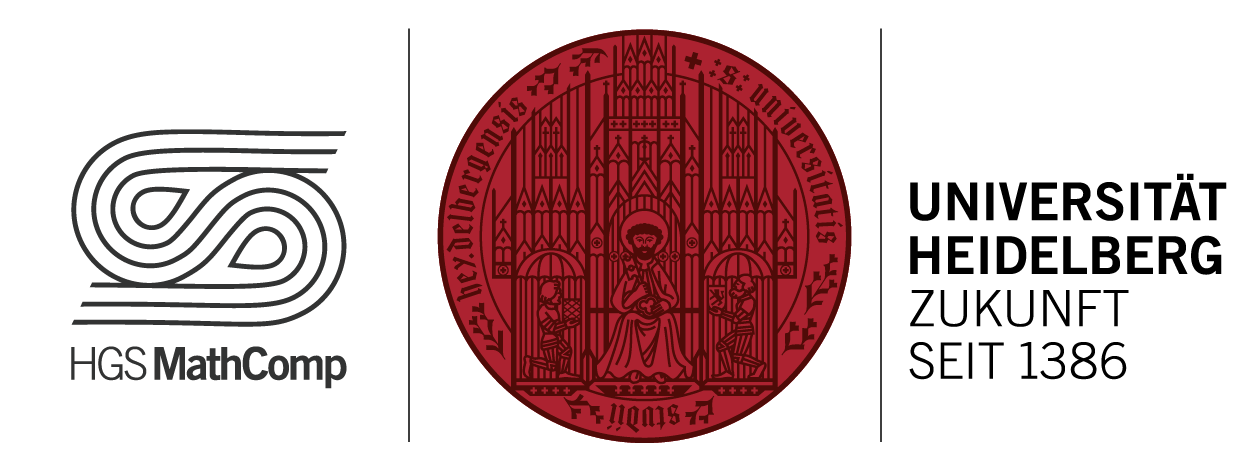HGS MathComp - Where Methods Meet Applications
The Heidelberg Graduate School of Mathematical and Computational Methods for the Sciences (HGS MathComp) at Heidelberg University is one of the leading graduate schools in Germany focusing on the complex topic of Scientific Computing. Located in a vibrant research environment, the school offers a structured interdisciplinary education for PhD students. The program supports students in pursuing innovative PhD projects with a strong application-oriented focus, ranging from mathematics, computer science, bio/life-sciences, physics, and chemical engineering sciences to cultural heritage. A strong focus is put on the mathematical and computational foundations: the theoretical underpinnings and computational abstraction and conception.
HGS MathComp Principal Investigators are leading experts in their fields, working on projects that combine mathematical and computational methodology with topical research issues. Individual mentoring for PhD candidates and career development programs ensure that graduates are fully equipped to take up top positions in industry and academia.
Location: Nižbor near Prague, Czech Republic
Registration: Please register on the event website • Registration open until July 31, 2025
Organizer: Faculty of Science, Charles University • 4EU+ European University Alliance
No prior experience in mathematics or biology is required—curiosity and interest matter more than background. The goal is to bring together motivated participants and researchers to explore topics ranging from population genetics and ecology to developmental biology, epidemics, and treatment models.
Interactive and Collaborative Format
Participants are warmly encouraged to bring their own questions or biological problems, which we can explore together with the aim of developing modelling approaches. Even without a specific question, there will be opportunities to engage in collaborative thinking, and in some cases, this could lead to early modelling results or future collaborations.
Accommodation and Registration
We have limited on-site accommodation available for participating students, which will be fully covered by the organizers. Accommodation at the venue is pre-booked and free of charge. A travel allowance of € 74 is available via 4EU+. Further costs can be covered by your HGS MathComp travel budget.
- Heidelberg University
- Sorbonne University (Paris)
- University of Milan
- University of Warsaw
These researchers work on diverse aspects of modelling biological systems and will share their expertise in talks and discussions.
More information is available on the course website.
For more see the abstract_file: Abstract-File
13:00 - 17:30
Location: Mathematikon • Conference Room, 5th Floor • Im Neuenheimer Feld 205, 69120 Heidelberg
Registration: Please register here
Organizer: HGS MathComp
This course will take place on September 23 and September 30, 2025.
Please use the comment section in the registration form to indicate your specific interests/use cases for 3D modelling.
This course is designed to equip scientists with the essential skills and knowledge to create high-quality 3D visualizations using Blender. This course will cover the basics of Blender, a powerful open-source software, and its application in scientific research and communication. Participants will learn how to create 3D graphics that will help to enhance their publications.
The workshop includes:
- Overview of Blender and its capabilities
- Navigating the Blender interface
- Essential techniques of 3D modeling
- Giving models a realistic finish with textures and lighting
For more see the abstract_file: Abstract-File
09:00 - 16:00
Location: Online
Registration: Please register on the event website
Organizer: Graduate Academy
The latest information and a registration link are available on the course website (log in with Uni-ID).
HGS MathComp fellows can get a reimbursement of the course fees. Please submit your proof of payment and certificate of participation to hgs@iwr.uni-heidelberg.de.
Contents in brief:
- Project-Management
- Planning with Milestones
- Agile Strategies and Techniques
- Time Boxing
- Adjusting Plans
- Efficient Time- and Self-Management
- Setting Priorities
- 80/20-Rule
- Pomodoro Technique
- Structuring your Work Day and Week
- Communication with Supervisor
- Efficient Writing


